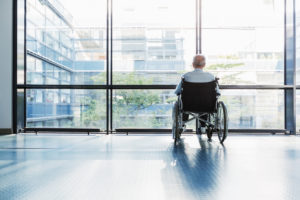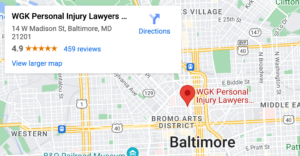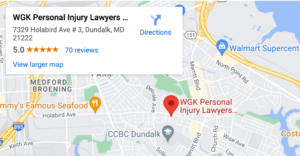
Quality long-term care is a concern for many individuals and families. Unfortunately, medical negligence, substandard care, and elder abuse occur in nursing homes. If a loved one was injured in a Baltimore nursing home, you deserve to be compensated. The Baltimore nursing home abuse lawyers at WGK Personal Injury Lawyers fight for the rights of nursing home residents.
We assist families in protecting their loved ones from continued abuse and neglect. We also fight for fair compensation for injuries and damages caused by nursing home abuse, neglect, and negligence. Contact our Baltimore office to schedule a free consultation, You can give us a call at (410) 837-2144 to speak with an experienced Maryland personal injury lawyer.
Table of Contents
How WGK Personal Injury Lawyers Can Help If a Loved One Has Been Abused

Dealing with a case of nursing home abuse is extremely emotional. In addition to the concern you have for your loved one, you may also experience intense anger toward the nursing home and its staff members. However, you need to think clearly now to help your loved one.
By hiring our law firm, you can take the time you need to focus on your family. At the same time, you can put yourself in the position to secure the compensation your family needs and deserves.
At WGK Personal Injury Lawyers, we’ve been standing up on behalf of injury victims in Baltimore for decades. For three generations, our family firm has been dedicated to giving victims of abuse and neglect a voice and helping them stand up to huge corporations with deep pockets. If someone you love has suffered at the hands of a nursing home, we’re here to help.
Our personal injury attorneys will handle all aspects of your injury claim. Among other things, you can expect us to:
- Provide the assistance, guidance, and support you need during this difficult time
- Work with professional investigators as we conduct a thorough review of your loved one’s abuse
- Gather and review evidence to support your claim
- Handle all paperwork and court filings related to your case
- Take care of conversations with interested parties, including nursing home staff and administration
- Work with experts to make sure we appreciate the full extent of your loved one’s injuries and suffering.
We’ll work diligently to negotiate a favorable settlement on your behalf. However, we’ll be ready to take your case to a jury if the nursing home or insurance companies refuse to cooperate.
To learn more, all you have to do is reach out to our compassionate team and set up a free consultation.
How Common is Nursing Home Abuse in Maryland?
It is estimated that five million seniors are the victims of elder abuse, exploitation, or neglect each year in the United States. Sadly, 93 percent of abuse cases are unreported each year. Abusers and negligence facilities get away with most of the cases of neglect and abuse each year.
During 2018, thousands of complaints were filed with various state agencies alleging elder abuse in Maryland:
- The Maryland Department of Aging, Long-Term Care Ombudsman Program investigated 3,712 complaints, which included 187 complaints involving resident abuse cases.
- The Maryland Department of Health, Office of Health Care Quality received 1,414 reports of abuse and 604 reports of neglect.
- The Maryland Department of Human Services Office of Adult Services, Adult Protective Services conducted 7,185 investigations.
Regardless of the numbers, the fact remains that one case of elder abuse is one case too many. Most nursing home residents are vulnerable adults because of physical or mental incapacities. Their condition makes them susceptible to all types of nursing home abuse.
Types of Nursing Home Abuse
There are several different types of nursing home abuse. A resident could be the victim of more than one type of abuse.
Nursing home abuse includes:
Physical Abuse
Physical abuse includes any bodily harm to a patient. It includes slapping, punching, shoving, pushing, pulling, and hitting. In some cases, nursing home abuse can be so severe that it results in a resident’s wrongful death.
Emotional Abuse
Emotional abuse is sometimes referred to as psychological abuse or verbal abuse. A person uses hurtful words to threaten, belittle, shame, degrade, bully, or criticize a resident. The person may also yell and scream at a patient.
Neglect
Neglect occurs when a patient’s physical or emotional needs are ignored.
Sexual Abuse
Any unwanted touching of sexual parts, rape, sexual acts, and taking explicit photographs of the patient falls under sexual abuse. Sexual abuse also includes forcing a patient to watch sexual acts or listen to explicit sexual language.
Financial Abuse
Financial abuse occurs when a patient’s money or property is stolen. It can include forging checks or using a resident’s information to open credit accounts. In some cases, the resident may be convinced to change a will or beneficiary.
Signs of Nursing Home Abuse and Neglect
Nursing home abuse can be difficult to detect. Many patients are unable to speak or communicate effectively. Therefore, the only way to identify abuse is through the signs of abuse or neglect.
When you visit your loved one in a nursing home, watch for signs of abuse and neglect. These can include, but are not limited to:
- Bedsores
- Unexplained bruises, welts, scratches, or lacerations
- Recurring infections, including sexually transmitted infections
- Unexplained injuries, such as broken bones, concussions, burns, and abrasions
- Changes in finances and missing property
- Poor hygiene, including dirty clothing, strong odors, and unkempt appearance
- Changes in mood, including depression, anxiety, increased confusion, and withdrawal
- Unexplained changes in weight, eating habits, or sleep habits
- Bruises and bleeding in the genital area
- Signs of dehydration and malnutrition
- Bruising around the ankles and wrists (signs of restraint)
- Sprains and dislocations
Any unexplained physical or emotional changes should be viewed as a sign of potential abuse. If a caregiver or administrator cannot explain what happened to your satisfaction, you may need to take immediate action to protect your loved one. Our Baltimore nursing home abuse lawyers can help. Give us a call to get started today.
Can I Sue a Nursing Home for Damages Caused by Abuse or Neglect?
State agencies and law enforcement agencies investigate reports of abuse and neglect. There may or may not be sufficient evidence to file criminal charges against a nursing home or staff member. Even if an agency finds that the nursing home was negligent, the agency may only fine the nursing home.
In either case, your loved one does not receive justice. The nursing home violated your trust and your loved one’s trust. Filing a civil lawsuit against the nursing home can help your loved one receive justice.
If the nursing home was negligent in allowing the abuse or neglect to occur, your loved one might be entitled to compensation for injuries and damages.
Examples of nursing home negligence and wrongdoing include, but are not limited to:
- Failing to establish policies and procedures that prevent abuse and neglect of patients.
- Failing to enforce its policies and procedures.
- Negligent hiring procedures, such as failing to conduct thorough background checks.
- Failing to immediately and thoroughly investigate all allegations of abuse or neglect.
- Failing to respond to and resolve complaints by patients and family members.
- Continuing to employ someone who has repeated complaints filed against him or her for patient abuse or neglect.
- Failing to provide adequate training, oversight, and supervision of staff members.
- Failure to keep premises safe and sanitary, including maintaining adequate safety and health policies.
- Failing to provide adequate supervision of patients and required medical treatment, including failing to transfer to a hospital or contact a doctor.
- Not maintaining sufficient staff to care for the number of residents.
- Failing to maintain adequate security and supervision of third parties.
If you are unsure whether a nursing home may be liable for your loved one’s damages and injuries, talk to a Baltimore nursing home abuse lawyer.
What Should You Do if You Suspect Nursing Home Abuse?
If you suspect that your family member has been abused or neglected in a nursing home, try to remain calm. Talk to your loved one and seek clarification from the nursing home staff and administrators. Carefully document every interaction.
You may need to take immediate action to secure your loved one’s safety if he or she is in danger. Depending on the severity of the abuse, you may need to contact the police. Nursing home abuse and neglect is a crime in Maryland.
Obtain medical care for your loved one with a doctor that is not affiliated with the nursing home. If the person needs emergency care, call 911 to request an ambulance or take the person to the emergency room. Document injuries by taking pictures or making videos.
As soon as possible, contact a Maryland nursing home abuse attorney. An attorney can help you take additional steps to secure your loved one’s safety and advise you of the next steps you should take to ensure the parties responsible for the abuse are held accountable.
Report suspected abuse or neglect to the Maryland Office of Health Care Quality by calling 877-402-8219. You can also report abuse to the Maryland Department of Aging, Long-Term Care Ombudsman Program by calling 1-800-243-3425.
What Damages are Available in a Nursing Home Abuse Lawsuit?
Compensation for a nursing home abuse lawsuit may include an award for financial damages. Financial damages may include the cost of medical care, transportation, and relocation to another assisted care facility.
In addition, an award may also include compensation for your loved one’s noneconomic damages. Noneconomic damages include physical pain, mental anguish, and emotional distress.
No amount of money can compensate your loved one fully for pain and suffering. Still, a monetary award can help provide the necessary care and treatment in the future at a better facility.
Is There a Deadline for Filing Nursing Home Abuse Claims in Maryland?
In most cases, a lawsuit for nursing home abuse has the same Statute of Limitations as other personal injury lawsuits. Therefore, a nursing home lawsuit generally must be filed within three years of the date of the injury. However, there could be exceptions.
Don’t miss out on the compensation you deserve because of a procedural technicality. Contact our Baltimore nursing home abuse lawyers as soon as possible.
Get Help From a Baltimore Nursing Home Abuse Lawyer
At WGK Personal Injury Lawyers, we understand that your first priority is the safety and wellbeing of a family member. Let our experienced Baltimore nursing home abuse attorneys handle the legal steps necessary to hold the abusers accountable for their wrongdoing and negligence. We provide compassionate legal services to seniors and their families.
Our Baltimore, MD personal injury law firm also offers:
- Car Accident Lawyers in Baltimore, MD
- Slip and Fall Accident Lawyers in Baltimore, MD
- Baltimore, MD Dog Bite Lawyers
- Bicycle Accident Lawyers in Baltimore, MD
- Baltimore, MD Aviation Accident Attorneys
- Baltimore, MD Medical Malpractice Lawyer
- Maritime Accident Lawyers in Baltimore, MD
- Baltimore, MD Wrongful Death Lawyers


